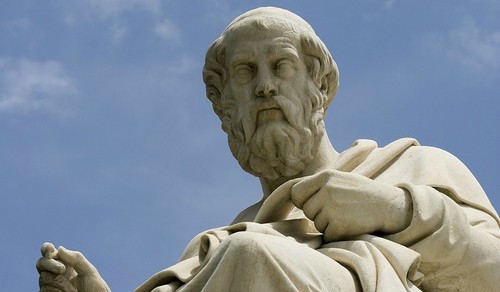We run our website the way we wished the whole internet worked: we provide high quality original content with no ads. We are funded solely by your direct support. Please consider supporting this project.

Is Your Christianity Shaped by Plato or the Bible?
The Timaeus is a work that Plato wrote that addresses the questions: “What is that which always is and has no becoming, and what is that which becomes but never is?” (Tim. 28a)? These questions contain one of the most influential – and, in my opinion, one of the most disastrous – philosophical ideas of all time!
Notice this: Plato’s questions presuppose that “that which always is” must be devoid of any “becoming” — which means, “that which truly is” can’t come into being, can’t change in any respect, and can’t perish. His question also presupposes that “that which becomes” never truly “is.” So, things that come into being, change and eventually perish never really exist.
What this means is that, in Plato’s view, the perpetually changing world we live in is not really real. The only thing that is really real is that which is absolutely unchanging. This is part of what Plato means when he describes the world of time and change as “a moving image of eternity” (Tim. 37d). As a moving shadow of a tree is to a real tree, so our physical world of time and change is to real reality. The physical world of time and change is a quasi-real moving shadow of a different, more real, eternally-the-same world.
Now, for Plato this eternally-the-same real world was a realm of abstract ideas that he called “Forms.” But later Platonists and Christians identified this realm with God, and the “Forms” as God’s ideas. Two things result from this.
First, God must be thought of as eternally unchanging. Nothing about God, including God’s knowledge and experience, can ever change in any respect. God can’t experience one thing one moment, and another thing another moment. Rather, God must experience all of time in one eternal now. This is where we get the very common assumption that “God is outside of time.”
Now, every verb ascribed to God in the Bible – including the teaching that God responds to prayer, is affected by the world, and became a human being – contradicts this frozen conception of God. The whole Bible narrative presupposes that God has a real “before” and “after,” and that God not only affects the world but is affected by the world. And yet, because of Plato’s influence, this frozen eternally-the-same conception of God has been the dominant conception throughout Church history. In fact, it constitutes the essence of what is called “the classical conception of God.”
Second, identifying God as “that which truly is” implies that every thing that transpires in the world of time and change must simply be a “moving image” of God’s will. History simply reflects the eternally-the-same will and knowledge of God. This is what I call “the blueprint worldview,” for in this view everything in time follows an eternal “blueprint” in heaven. When in the face of tragedy people instinctively recite mantras like, “Everything happens for a reason,” or “Nothing happens by accident,” they are reflecting this platonic, blueprint worldview.
Now, I would argue that it’s very hard to reconcile this view with the Bible. Yes God brings a purpose to everything (Rom. 8:28), but the Bible doesn’t teach that everything happens because of a divine purpose. Rather, the Bible teaches that God is against a lot of things that happen, for they are evil. It’s also very hard (impossible, in my view) to reconcile this platonic, blueprint view with free will and with the fact that the world is filled with nightmarish evil. But my point right now is that the only reason we have these problems in the first place is that we have inadvertently allowed ourselves to come under Plato’s assumption that “that which truly is” must be devoid of “becoming.”
The question we need to ask ourselves is this: Why should we assume that “that which truly is” must be devoid of all becoming or that “that which becomes” cannot truly exist? Why must God be frozen? Why can’t God change, be affected, be responsive, etc. … precisely because he “truly is”? What, after all, is so imperfect about “becoming”?
Obviously, God can’t come into being or go out of being. God can’t “become” in that sense. But that is simply one kind of change. There are other kinds of change that are not only compatible with perfection, but required by it. For example, if one person changes their demeanor in response to another person’s suffering, that is not evidence of a defect in that person. It’s rather evidence that they are a loving person. So too, if God is love, as the Bible teaches, shouldn’t we expect God to be the most changing being because he lovingly responds to all people at all times. This is the opposite of a deity who’s frozen in eternal sameness.
Plato has a lot of great insights. I love reading him. But when it comes to thinking about God and time and change, I encourage you to take your cues from the Bible, not Plato (and thus not traditional theology insofar as it’s influenced by him). The true God is not frozen!
Image by lentina_x via Flickr
Category: General
Tags: Attributes of God, Blueprint Worldview, Change, God, Open Theism, Perfection, Plato, time
Topics: Apologetics
Related Reading

God is Not a Monster
Pastor Brian Zhand has a way with words that captures the imagination. And he is a pastor that has taken time to read the church fathers. In a recent post, he quotes Saint Antony who wrote, “I no longer fear God, but I love him. For love casts out fear.” Brian confronts the common misconceptions and images of God that…

The Cruciform Center Part 1: How Matthew, Mark and Luke Reveal a Cruciform God
In the previous series of posts I’ve argued that a merely “Christocentric” approach to God is too general, as can be shown by the widely different conceptions of God people arrive at, despite their claim to be “Christocentric.” The confession that Jesus reveals what God is like is simply too abstract, for it leaves too…

What is your perspective on the classical view that God is above time?
In a major strand of hellenistic (Greek) philosophy, change was seen as being an imperfection. This idea was adopted by many early Church fathers and eventually became almost an assumed dogma of the Church. It was thus assumed that, since God is perfect, he must be above all change. Not only does his character and…

Greg’s Interview on The Christian Transhumanist Podcast
Here is an interview I did for The Christian Transhumanist Podcast that I wanted to share with all of you. Micah Redding and I discuss everything from Relativity Theory to Politics. I think you’ll find it interesting, but I want to offer a word of clarification before you listen. At one point in this interview…

How do you respond to 1 Timothy 4:1–3?
“…in the later times some will renounce the faith by paying attention to deceitful spirits and teachings of demons, through the hypocrisy of liars whose consciences are seared with a hot iron. They forbid marriage and demand abstinence from foods…” New Testament authors considered themselves to be living “in the later times” (e.g. Acts 2:17;…

How do you respond to 1 Kings 13:2–3?
The Lord proclaims against the pagan alter of Jeroboam, “O altar, altar, thus says the Lord: ‘A son shall be born to the house of David, Josiah by name; and he shall sacrifice on you the priests of the high places who offer incense on you, and human bones shall be burned on you.’ He…
